Will Russia-Ukraine war impact UK food prices? Which products could see price rises and supply issues
and live on Freeview channel 276
Russia’s invasion of Ukraine is now in its fourth week, with Vladimir Putin’s troops bogged down amid strong opposition from Ukrainian forces.
The conflict has come at a big human cost, with thousands of people dead and around three million others fleeing to neighbouring countries.
Advertisement
Hide AdAdvertisement
Hide AdBut the implications of the war and the sanctions on Russia are also now being felt - especially in the UK where households are battling a major cost of living crisis.
Inflation is reducing purchasing power, with energy bills rising, fuel costs rocketing and food prices soaring.
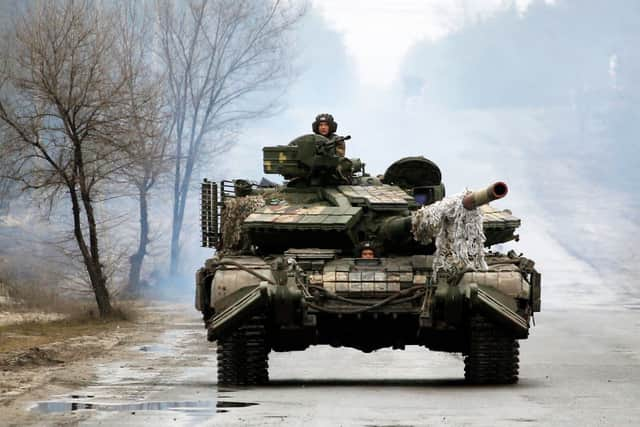

The price of food looks set to get worse as the Russia-Ukraine crisis poses major challenges for the food and drink industry.
So what exactly are these challenges - and what impact could they have on the price and availability of British produce?
Why is Russia-Ukraine war bad for food prices?
Advertisement
Hide AdAdvertisement
Hide AdThe proximity of Ukraine and Russia to the UK - both geographically and economically - means we are exposed to the invasion - especially when it comes to food.
Both countries are key breadbaskets for Europe.
But Ukraine is unable to export much because of the invasion (it’s introduced a national shutdown of its Black Sea ports).
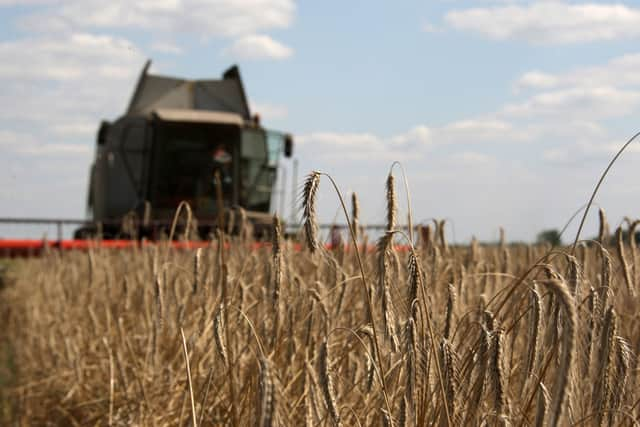

And Russia is either being prevented from or refusing to export its produce to the West as a result of the sanctions placed against it.
Ukraine and Russia are responsible for 60% of the world’s sunflower oil, according to the Food and Drink Federation.
Advertisement
Hide AdAdvertisement
Hide AdSunflower oil is a key ingredient in everything from mayonnaise to cosmetics.
Other key food exports from both countries include wheat (Ukraine and Russia provide 30% of global exports) and rapeseed oil.
Even though the UK does not import all of these foods (trade body UK Flour Millers says we use no Ukrainian or Russian wheat in foods destined for human consumption), we still face price implications.
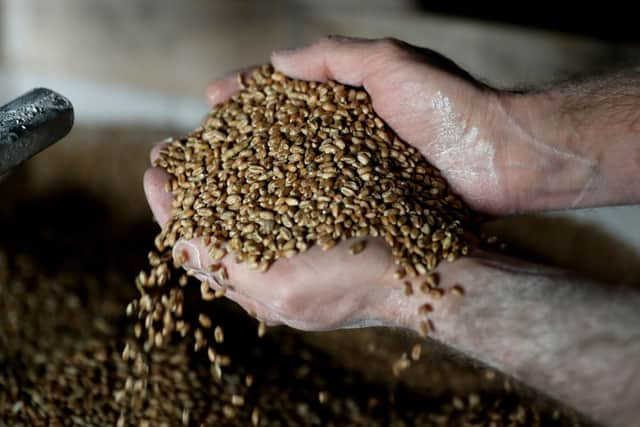

And these could be passed onto consumers.
For example, the price of wheat on the London futures market rose by 28% between 16 February and 3 March according to Alex Waugh, director of UK Flour Millers.
Advertisement
Hide AdAdvertisement
Hide Ad“It is inevitable that in time [high prices] will feed through in increased consumer prices for a range of foodstuffs that depend on grain as a key input, like bread, but also a range of other foods such as eggs, meat and more,” said Mr Waugh.
“This is likely to lead to a higher level of UK food price inflation, sustained over a longer period than had already been anticipated.”
The latest consumer price index (CPI) for January 2022 showed overall food and drink prices were 4.3% higher than a year ago.
This is because of a combination of poor harvests, high fuel and energy costs, as well as Brexit.
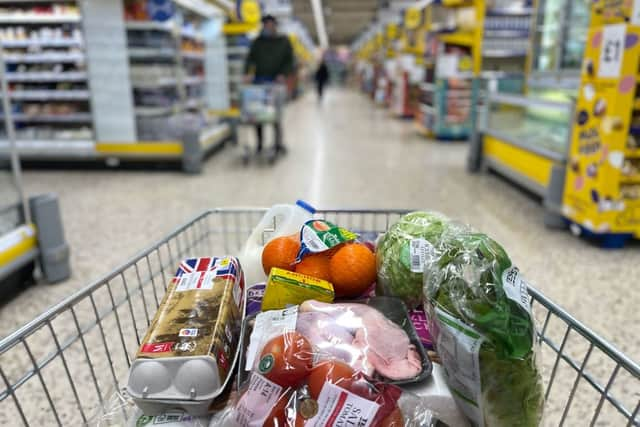

Advertisement
Hide AdAdvertisement
Hide AdBut the extent of price rises as a result of the invasion will not be fully seen until the Office for National Statistics (ONS) publishes the March 2022 CPI in April.
That hasn’t stopped speculation though.
Ronald Kers, the boss of 2 Sisters Food Group - a major supplier of poultry that owns brands like Bernard Matthews - says food inflation could rise to 10% or 15% if the war continues.
How will Russia-Ukraine crisis affect British produce?
What Britain grows and rears will also feel the effects of it Russia’s invasion of Ukraine.
NationalWorld has taken a look at some of the major fresh food categories to see how they might be affected.
Fruit and vegetables
Advertisement
Hide AdAdvertisement
Hide AdThere are two key issues facing fruit and veg growers as a result of the conflict in Ukraine: production costs and labour.
Production inputs include things like fertiliser for increasing crop yields.
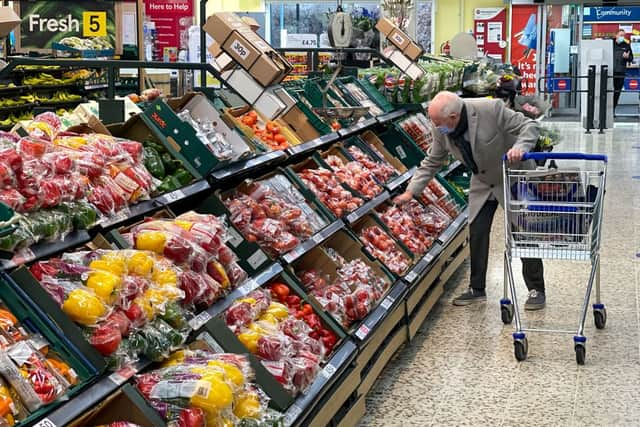

Their prices are being driven up because Russia provides many of the raw ingredients for them, as well as the fuel to produce them.
This issue was spelled out by the CEO of Yarra, one of the world’s largest fertiliser suppliers, who told the BBC there could be a global shortage of fertiliser - a problem which could also precipitate another CO2 crisis.
Advertisement
Hide AdAdvertisement
Hide AdIt means there will be “a difficult and uncertain season for growers and buyers alike” this year, according to British Growers Association CEO Jack Ward.
“Last week, one grower I spoke to paid £600 per tonne of fertiliser. This week, the price is £900 per tonne,” Mr Ward told NationalWorld.
“Red diesel [a special type of fuel for tractors] was 80p a litre last week - it’s now £1.20.”
He said “difficult conversations” over pricing were now likely to take place between suppliers and supermarkets.
Advertisement
Hide AdAdvertisement
Hide AdGas itself is also a key input for farmers of crops grown in heated glasshouses, which includes foods like tomatoes and strawberries.
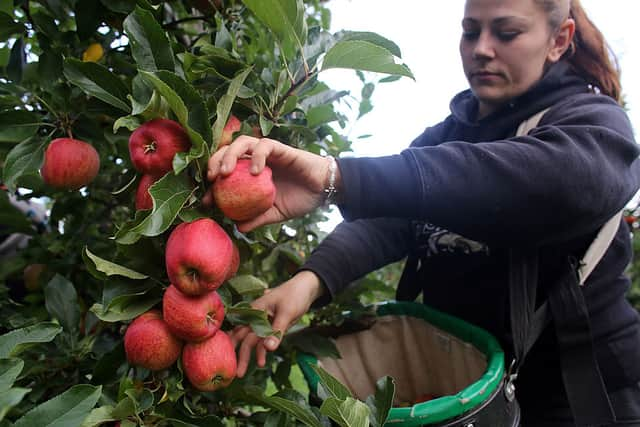

Ali Capper, chair of the NFU Horticulture & Potatoes Board, says it costs eight to 12-times more to heat a glasshouse than it did this time last year.
She says electricity prices have also gone up 50% to 80%, which is an issue for crops that are stored for lengthy periods, such as apples and potatoes.
“I’ve heard from one grower who has planted and invested in a crop and is now thinking of shutting down that glasshouse because inputs are too expensive,” Ms Capper told NationalWorld.
Advertisement
Hide AdAdvertisement
Hide Ad“It’s not just a British problem, but also a European one. Everyone is being hit by higher gas prices, so it’s quite likely there will be shortages.”
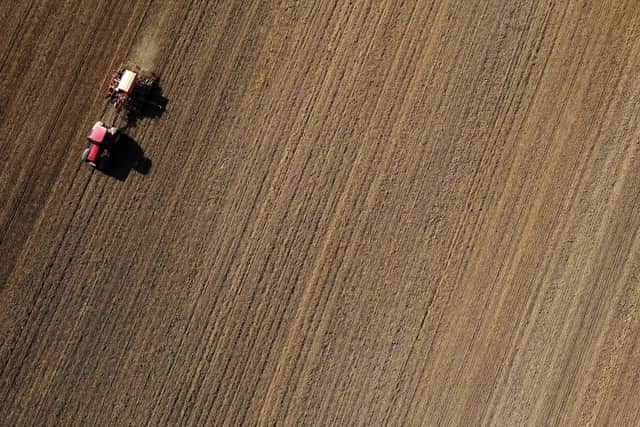

The other key issue facing growers is there could be a shortage of seasonal agricultural workers - people who come from abroad to pick and pack everything from asparagus to strawberries.
Last year, 60% to 70% of the workers who came to the UK to do this work were from Ukraine.
Given the war, it’s unknown how many of these workers will be able to come to the UK.
Advertisement
Hide AdAdvertisement
Hide Ad“The start of the season is just weeks away. If we haven’t got enough workers, availability becomes an increasingly big issue,” said Mr Ward.
However, there is confidence in some parts of the sector that workers will be found elsewhere.
“I hear from recruiters that they are confident they will be able to get enough people,” says chair of berry trade body British Summer Fruits, Nick Marston.
“But there will be some delays in people arriving and the people that do come are likely to be less experienced.”
Advertisement
Hide AdAdvertisement
Hide AdEmploying less experienced staff means “growers may have to walk away” from harvesting some crops, Marston says, but he doesn’t believe “there will be a significant reduction” in the availability of fruit.
Meat and dairy
Similarly to fruit and veg growers, livestock farmers need fertiliser - although it is used to grow grass for feed.
And other feed, like wheat and maize, is rocketing in price as a result of the war.
This was laid out explicitly this week by Ronald Kers, CEO of 2 Sisters Food Group.
Advertisement
Hide AdAdvertisement
Hide Ad“Prices from the farm gate have already risen by almost 50% in a year,” Mr Kers said. “Our chicken doesn’t arrive on dinner tables without farmers. In fact, with no agriculture, there’s no business for us.
“Our concern is that a lot of people haven’t realised the food production clock is ticking. Ukrainian farmers should be sowing crops in March, instead they’re fighting for their country.
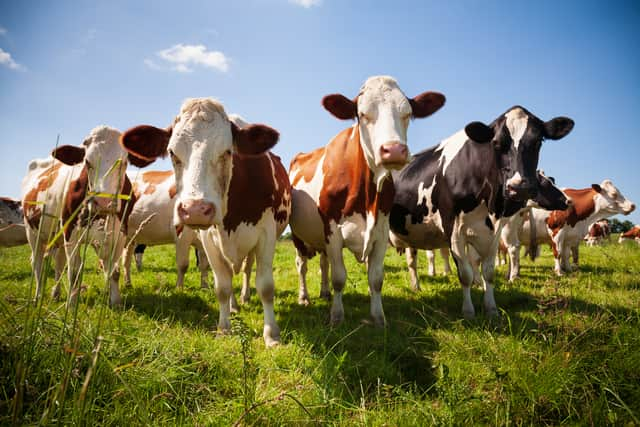

“The reality is companies like 2 Sisters trade globally, and the smooth flow of trade links between states are vital. Without measures to isolate states from food security risks, there will be less food and higher prices to pay, with the poorest in society hit hardest.”
Trade body the British Meat Processors Association echoed Mr Kers, and called on the UK Government to recognise “the enormity of the looming food crisis”, as well as move “to more of an emergency footing”.
Advertisement
Hide AdAdvertisement
Hide AdIn response, the Government says it does not believe there will be “any significant direct impact on UK food supply” and said it was in “regular contact” with the food sector “to understand the impacts of global events on supply chains”.
Support people fleeing the devastating conflict in Ukraine: donate to the DEC appeal
Disasters Emergency Committee (DEC) charities and their local partners are in Ukraine and in neighbouring countries providing food, water, shelter and medical assistance. Learn more and donate what you can today.
A message from the editor:
Thank you for reading. NationalWorld is a new national news brand, produced by a team of journalists, editors, video producers and designers who live and work across the UK. Find out more about who’s who in the team, and our editorial values. We want to start a community among our readers, so please follow us on Facebook, Twitter and Instagram, and keep the conversation going. You can also sign up to our email newsletters and get a curated selection of our best reads to your inbox every day.
Comment Guidelines
National World encourages reader discussion on our stories. User feedback, insights and back-and-forth exchanges add a rich layer of context to reporting. Please review our Community Guidelines before commenting.
